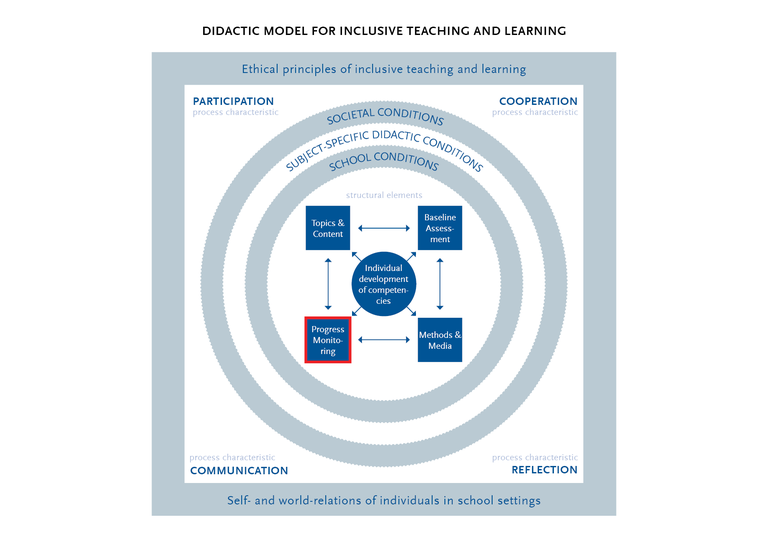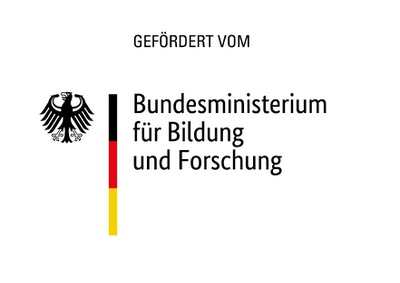Progress Monitoring (Angelika Thäle)
Suggested citation: Thäle, A. (2022). Progress Monitoring. In J. Frohn (Ed.), Inclusive Teaching and Learning - Glossary. Berlin: Humboldt-Universität zu Berlin. URL: https://hu.berlin/fdqi-en-glossary.
► Download the PDF to this glossary entry

In the “Hamburg Model”, Wolfgang Schulz uses the term “progress monitoring” to imply self-monitoring by learners as a way of co-controlling their learning processes. He also calls for reviews of the efficacy of teaching (self-monitoring by teachers) (cf. Schulz, 1991, 41f.). This shift towards (assessment-based) forms of self-monitoring, error analysis and verbal feedback in the teaching-learning process and the marked scepticism shown towards the awarding of grades (ibid) corresponds with the approaches to progress monitoring that are given preference in discourse on inclusive education (cf. Prengel, 2013; Seitz, 2006; Textor et al., 2017).
In an academic context, performance can be understood as the confluence of ideas of knowledge and behaviour expressed in school-specific systems (cf. Budde & Rissler, 2017, p. 180). With regard to progress monitoring, a distinction is usually made between subject-specific/criteria-based, individual and social comparative reference standards (cf. Rheinberg, 2001). While the criteria-based reference standard has become omnipresent since PISA due to the focus on standards prevalent in the various curricula, the standardised performance requirements in comparative studies and the centralisation of final assessments, progress monitoring in inclusive settings favours orientation according to the individual reference standard (cf. Katzenbach, 2012; Prengel, 2013; Seitz, 2006). However, this does not imply moving completely away from a criteria-based reference standard (cf. Katzenbach, 2012, p. 128). Prengel, for example, advocates a multi-perspective concept of performance that firstly enables all pupils to experience acknowledgement of their individual learning progress, and secondly does not exclude engagement with performance hierarchies, e.g. on the basis of domain-specific multi-stage models. However, the fundamental prerequisite for this is that each pupil, regardless of their attainments, is part of the learning group (cf. Prengel, 2013, 182f.). This requires an open, trustful culture of communication within the learning group so that strengths and weaknesses are discussed respectfully, without discrimination or humiliation, and are not ignored (cf. ibid, p. 182).
An understanding of progress monitoring in the sense of formative assessment, as a process that accompanies learning, requires new instruments and methods of evaluation. These include working with competency grids, self-monitored learning tasks, portfolios and learning maps, individually adjusted feedback and the writing of progress reports for all pupils (cf. Winter, 2015). More attention is also being paid to feedback on group performance, e.g. during presentations.
Comprehensive didactic diagnostic competencies (cf. Walm et al., 2017) are required if the teacher is to recognise the pupils’ individual strengths and potentials, develop tasks for learning new material and demonstrating achievements (cf. Luthiger, 2012), and communicate the results of the progress monitoring in a way that serves to foster the pupils’ learning (cf. Winter, 2015, p. 79). In this respect, cooperation between colleagues – in the form of team teaching or interdisciplinary dialogue at school level – is an important resource.
Moreover, the object of the evaluation must be transparent, especially since the strategy of narrowing progress evaluations to the cognitive dimension is widely criticised in the context of inclusive pedagogy (cf. Prengel, 2017; Seitz, 2006, individual development of competencies). In addition, methods of fostering subject-specific progress should be closely linked with the development of academic language competencies, as these lay the foundations for better performance at school.
Until now, the methods and instruments of inclusive progress monitoring oriented toward the individual reference standard have been subject to restrictions, as the school system still fulfils a function of social allocation (cf. Fend, 2009) that entails selective practices – mostly implemented at the end of the primary school period. The wide range of grading and assessment systems established from the lower-secondary level upwards in Berlin,¹ for example, reflects a somewhat helpless-seeming attempt to objectify or orchestrate assessment practice in heterogeneous learning groups while trying to fulfil the allocation function. The fact that new processes of comparison and stigmatisation may arise within the learning group due to the award of extra grades can also be seen. However, even abandoning the concept of awarding grades would not completely dissolve the tension between performance heterogeneity in teaching practice. With regard to inclusive sport lessons, for example, Pfitzner and Veber (2017) raise the provocative question of whether goals scored by disabled pupils should count double because the child in question has no tactical understanding of the game, thereby placing the team at a disadvantage.
Seitz’s statement that an inclusive learning culture also requires an inclusive performance culture (cf. Seitz, 2006, p. 198) is currently being conceptualised in theory rather than implemented in practice.
One special concern of the FDQI-HU project is that the field of tension between criteria-based and individual reference standards in inclusive teaching should be dealt with from a subject-specific perspective.
Literatur
Budde, J. & Rißler, G. (2017). Die Exklusion aus dem schulischen Anspruch. (Re-) Produktionsprozesse sozialer Ungleichheit im Unterricht in der Sekundarstufe I [The exclusion from school claim. (Re-)production processes of social inequality in lessons at secondary education]. In I. Diehm, M. Kuhn & C. Machold (Eds.), Differenz - Ungleichheit - Erziehungswissenschaft [Difference - inequality – education science] (p. 179–198). Wiesbaden: Springer VS.
Fend, H. (2009). Neue Theorie der Schule. Einführung in das Verstehen von Bildungssystemen [New theory of school. Introduction in the understanding of education systems] (2nd ed.). Wiesbaden: Springer VS.
Katzenbach, D. (2012). In Widersprüchen denken und dennoch handlungsfähig bleiben. Inklusion in einem segregierenden Schulsystem [Thinking in contradictions and nevertheless remaining capable of acting. Inclusion in a segregating school system]. In GEW Lüneburg (Ed.), Dokumentation zur 67. Pädagogischen Woche 2011 [Documentation on the 67th Pedagogical Week 2011] (p. 99–133). Lüneburg.
Luthiger, H. (2012). Lern- und Leistungsaufgaben in einem kompetenzorientierten Unterricht [Learning and performance tasks in a competence-oriented lesson]. Haushalt in Bildung & Forschung 1 (3), 3–14.
Pfitzner, M. & Veber, M. (2017). Zählen „Behindertentore“ doppelt? - Ein theoretisch-empirischer Blick auf inklusiven Sportunterricht [Do “goals for the handicapped” count twice? - A theoretical-empirical view of inclusive gym classes]. In A. Textor, S. Grüter, I. Schiermeyer-Reichl & B. Streese (Eds.), Leistung inklusive? Inklusion in der Leistungsgesellschaft [Achievement inclusive? Inclusion in the achievement-oriented society] (p. 88–95). Bad Heilbrunn: Klinkhardt.
Prengel, A. (2013). Humane entwicklungs- und leistungsförderliche Strukturen im inklusiven Unterricht [Humane structures conducive to development and achievement in inclusive education]. In V. Moser (Ed.), Die inklusive Schule. Standards für die Umsetzung [The inclusive school. Standards for the implementation] (2nd ed., p. 177–185). Stuttgart: Kohlhammer.
Prengel, A. (2017). Individualisierung in der „Caring Community“ – Zur inklusiven Verbesserung von Lernleistungen [Individualisation in the “Caring Community” – Inclusive improvement of learning achievements]. In A. Textor, S. Grüter, I. Schiermeyer-Reichl & B. Streese (Eds.), Leistung inklusive? Inklusion in der Leistungsgesellschaft [Achievement inclusive? Inclusion in the achievement-oriented society] (p. 13–27). Bad Heilbrunn: Klinkhardt.
Rheinberg, F. (2001). Bezugsnormen und schulische Leistungsbeurteilung [Reference marks and school appraisal]. In F. E. Weinert (Ed.), Leistungsmessungen in Schulen [Assessments in schools] (p. 59–71). Weinheim: Beltz.
Schulz, W. (1991). Die lerntheoretische Didaktik [The learning-theoretical didactics]. In H. Gudjons, R. Teske & R. Winkel (Eds.), Didaktische Theorien [Didactic theories] (6th ed., p. 29–45). Hamburg: Bergmann + Helbig.
Seitz, S. (2006). Inklusive Didaktik nach PISA [Inclusive didactics after PISA]. Vierteljahresschrift für Heilpädagogik und ihre Nachbargebiete (3), 192–199.
Textor, A., Grüter, S., Schiermeyer-Reichl, I. & Streese, B. (Eds.) (2017). Leistung inklusive? Inklusion in der Leistungsgesellschaft [Achievement inclusive? Inclusion in the achievement-oriented society]. Bad Heilbrunn: Klinkhardt.
Walm, M., Schultz, C., Häcker, T. & Moser, V. (2017). „Diagnostik und Leistungsbewertung im Dienste des Lernens“ – Theoretische Perspektiven auf ein inklusives Entwicklungsfeld [“Diagnostics and assessment in service of learning” – Theoretical perspectives on an inclusive development field]. In A. Textor, S. Grüter, I. Schiermeyer-Reichl & B. Streese (Eds.), Leistung inklusive? Inklusion in der Leistungsgesellschaft [Achievement inclusive? Inclusion in the achievement-oriented society] (p. 113–120). Bad Heilbrunn: Klinkhardt.
Winter, F. (2015). Lerndialog statt Noten. Neue Formen der Leistungsbeurteilung [Learning dialogue instead of grades. New forms of appraisal]. Weinheim: Beltz.
[1] In key subjects, a distinction is usually made between assessments at basic (G) and advanced (E) level, starred grades for pupils with special learning needs, verbal assessments for pupils with special needs centred around intellectual development, and compensation for disadvantages if applicable.

